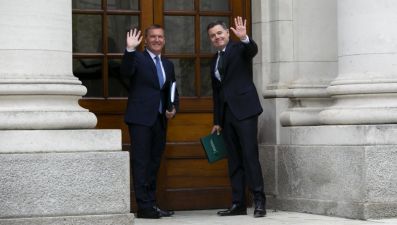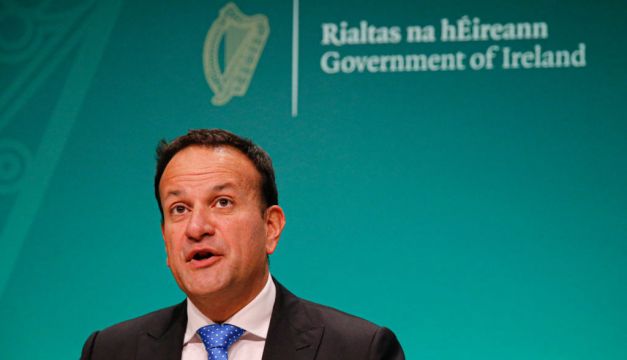The Tánaiste has raised the prospect that the 9 per cent VAT rate for the hospitality sector could be extended beyond the end of February next year.
Leo Varadkar did not rule out the rate being extended, despite the Minister for Finance Paschal Donohoe outlining in the Dail in his budget day speech that it will cease on February 28th next.
Mr Varadkar said it will be reviewed closer to the time and that whether it will be extended depended on the economic situation.
“The (9 per cent) rate which applies to electricity to gas and hospitality has been extended until the end of February,” Mr Varadkar said.
“That will give people some uncertainty in that regard. The intention is to increase it in March.
“But obviously we’ll have to review the situation again before then and depending on how we’re doing in terms of the public finances, how we’re doing in terms of the economic performance, but the decision is that it’s extended until the end of February.”
#Budget2023 helps with the cost of petrol, diesel, oil, electricity, and gas by extending the current reductions in excise duty and VAT. This will help families across the country with the cost of living. pic.twitter.com/ypppFRawsY
— Fine Gael (@FineGael) September 27, 2022
Asked to clarify his remarks Mr Varadkar said: “The decision of Government is that they will be extended until the end of February and they go back up on March 1st.
“But of course we’ll have to review the situation before them to see how we’re doing in terms of the public finances, in terms of the economy and in terms of employment.”
Mr Varadkar made the comments at a press conference in Government Buildings as he outlined details of five new schemes aimed at helping businesses of different sizes to deal with rising energy costs.
The Tanaiste said the first scheme, the Temporary Business Energy Support Scheme (TBESS), will help small businesses the most, but he expected almost all businesses across the country to apply for it.
It will provide businesses with up to 40 per cent of the increase in electricity or gas bills up to €10,000 per month
It will be administered by the Revenue Commissioners and will operate on a self-assessment basis.
With the Tánaiste @LeoVaradkar & @daracalleary for the @DeptEnterprise press conference#Budget2023 will help business & workers with rising costs
We have increased funding to work with businesses on developing their digital transformation, green agenda & talented people pic.twitter.com/xWSPz1GW2w— Damien English TD (@Damien_English) September 27, 2022
The first payments are expected in November but they will be backdated to September and will run until at least February next year.
He said it could end up costing more than €1.4 billion.
The second scheme is a €200 million targeted Ukraine Enterprise Crisis Scheme to assist viable but vulnerable businesses in the manufacturing and internationally traded services sectors that are suffering the broader effects of the war in Ukraine as well as increasing energy costs.
It will be administered through Enterprise Ireland, IDA and Udaras na Gaeltachta and eligible businesses must produce an energy efficiency plan which shows how they will get their energy costs down.
Mr Varadkar also announced details of a €1.2 billion State-backed Ukraine Credit Guarantee Scheme to assist the wider business sector with liquidity and to invest in energy efficiency.
He said it will provide low-cost working capital to SMEs, primary producers and businesses with fewer than 500 employees with up to €1 million, on a six-year term, with no collateral required for loans up to €250,000.
It is in addition to a new Growth & Sustainability Loan Scheme, which will make up to €500 million in low-cost investment loans of up to 10 years available to SMEs, including farmers and fishers and small businesses, with no collateral required for loans up to €500,000.
The Government also announced an additional €4 million in funding to the Local Enterprise Office network to include a new grant for microenterprises for energy efficiency.
The Small Firms Investment in Energy Efficiency Scheme will provide a grant to companies to encourage capital investment in projects to reduce carbon emissions.
Mr Varadkar said the Budget was all about restoring confidence and putting “more money in people’s pockets” as rising costs were making it very expensive for people to do the weekly shop, to fill their car and pay their utility bills.
“We know that times are very tough,” he said.
“This Budget is being gone against the backdrop of inflation and price increases the likes we have not seen in generations. Everyone is being squeezed and some people are finding it hard to make ends meet and are worried about winter.

“Understandably businesses and employers as well are very worried heading into heading into winter. The cost of energy and the cost of doing business is rising sharply.
“Interest rates are also going up and consumer confidence is waning so this budget is about restoring confidence. It’s about putting more money in people’s pockets and reducing some of the bills that people and businesses have to pay.”
He added that people could “rely” on the Government to ensure the economy remained strong.







